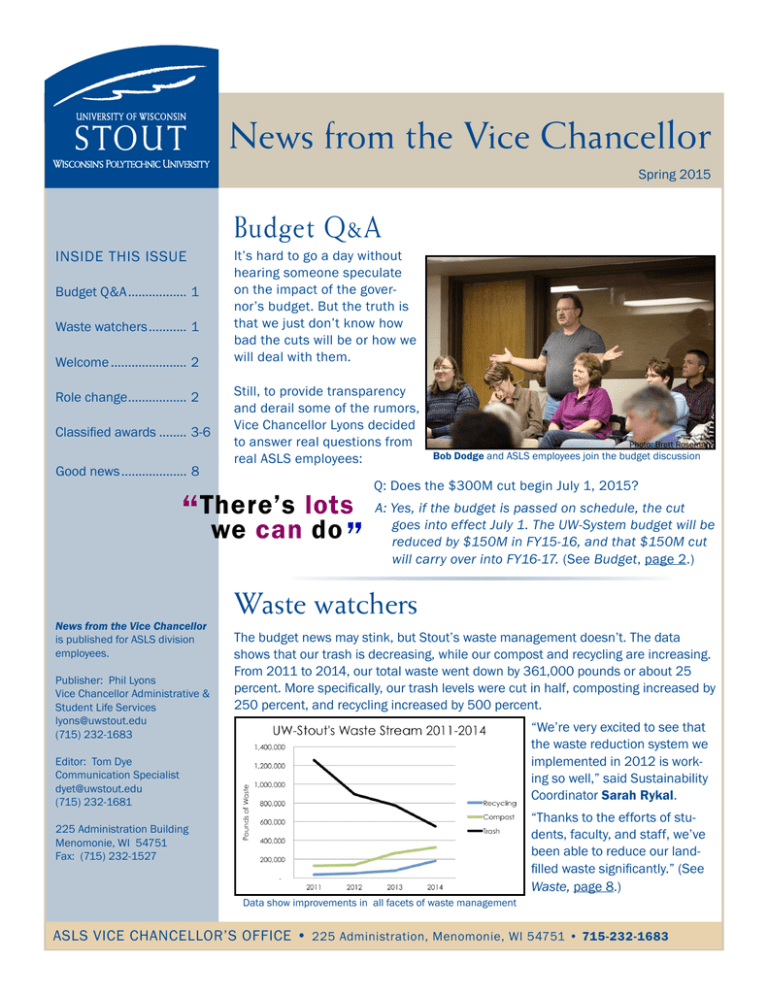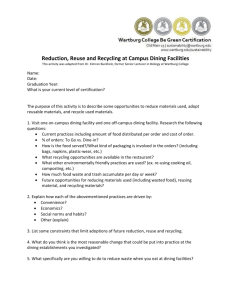lor News from the Vice Chancel Budget Q&A
advertisement

News from the Vice Chancellor Spring 2015 Budget Q&A INSIDE THIS ISSUE Budget Q&A.................. 1 Waste watchers............ 1 Welcome....................... 2 Role change.................. 2 Classified awards......... 3-6 Good news.................... 8 It’s hard to go a day without hearing someone speculate on the impact of the governor’s budget. But the truth is that we just don’t know how bad the cuts will be or how we will deal with them. Still, to provide transparency and derail some of the rumors, Vice Chancellor Lyons decided to answer real questions from real ASLS employees: lots “There’s we can do ” News from the Vice Chancellor is published for ASLS division employees. Publisher: Phil Lyons Vice Chancellor Administrative & Student Life Services lyons@uwstout.edu (715) 232-1683 Photo: Brett Roseman Bob Dodge and ASLS employees join the budget discussion Q: Does the $300M cut begin July 1, 2015? A: Yes, if the budget is passed on schedule, the cut goes into effect July 1. The UW-System budget will be reduced by $150M in FY15-16, and that $150M cut will carry over into FY16-17. (See Budget, page 2.) Waste watchers The budget news may stink, but Stout’s waste management doesn’t. The data shows that our trash is decreasing, while our compost and recycling are increasing. From 2011 to 2014, our total waste went down by 361,000 pounds or about 25 percent. More specifically, our trash levels were cut in half, composting increased by 250 percent, and recycling increased by 500 percent. “We’re very excited to see that the waste reduction system we implemented in 2012 is working so well,” said Sustainability Coordinator Sarah Rykal. Editor: Tom Dye Communication Specialist dyet@uwstout.edu (715) 232-1681 “Thanks to the efforts of students, faculty, and staff, we’ve been able to reduce our landfilled waste significantly.” (See Waste, page 8.) 225 Administration Building Menomonie, WI 54751 Fax: (715) 232-1527 Data show improvements in all facets of waste management ASLS VICE CHANCELLOR’S OFFICE • 225 Administration, Menomonie, WI 54751 • 715-232-1683 Welcome John Arnold the joined University Dining’s Commons dining team as a service lead on January 16. John has over 15 years of experience in multiple restaurants from fine dining, Fanny Hill and Stella Blues, to corporate operations, Red Lobster. John has a B.S. in communications from UW-Eau Claire. John Kelly Etlicher joined University Dining’s North Point dining team as a service manager on February 25. Kelly has 10 years of experience in multiple foodservice areas, including restaurants and institutions. She earned her culinary management degree from Western Wisconsin Technical College in La Crosse. Jamie Klinkhammer joined Business and Financial Services as a shipping mailing associate. Jamie lives in Colfax and enjoys working on anything with a motor in it. Depending on the season, Jamie rides snowmobiles and motorcycles. The recent warm weather has him itching to get his bike on the road. Role change Kelly On February 16, Jason Horzewski left his position as food production assistant in the MSC to become the service manager at the Commons. Jason has a B.S. in Hotel, Restaurant and Tourism Management from UW-Stout and is in his third year as a permanent employee of University Dining. As a student, Jason worked for University Dining as a student manager. He also has experience outside the university in multiple foodservice operations. Budget (continued from page 1) Jamie Q: When will we know the actual extent of the cut? A: Unfortunately, we won’t know until the budget passes. That may not happen until July 1—or later. At this point, the governor’s budget is in the hands of the Joint Finance Committee and the legislature. They are supposed to pass a budget in time for it to be enacted on July 1. Of course, the legislature might not pass the budget in time or, if they do, the governor might veto portions of it. We can’t sit still, though. We have to prepare for the governor’s proposed cuts, while hoping for the best. Jason 2 Q: What are the exact realities of the UW System fund balances? What is restricted and unrestricted? How much of the unrestricted fund balance was used in the past two years since the great controversy? How much unrestricted funding is left? NEWS FROM THE VICE CHANCELLOR Budget (continued) A: Let’s focus on the campus balance. At the end of FY14-15, we expect to have a total balance just under $12M. Half of that balance, though, is restricted—meaning we already have specific obligations for the money and can consider it “already spent,” such as to pay off debts for capital projects. That leaves a balance of roughly $6M. It’s important to note that the budget cut is permanent, but the $6M balance is one-time money and is not replenished each year. If we spend our entire balance in FY15-16, it would only postpone the inevitable. In FY16-17, we would need to cut an additional $6M to balance the budget. Q: What is our strategy to deal with the cuts? A: When managing the cuts, the university will adhere to the principles the Strategic Planning Group endorsed: 1. Protect the integrity and quality of instruction as defined by our accrediting bodies. 2. Make data-informed budget decisions. 3. To the degree possible, ensure that budget decisions complement FOCUS 2020 goals and maintain sufficient flexibility to respond to emergencies. 4. Make budget reductions that are strategic and not across the board. 5. Ensure the process is transparent and considers all possible options, while seeking input from all campus constituencies. As the chancellor communicated, the budget managers and unit directors were asked to complete an exercise where they looked at the impact of 5, 10, and 15 percent reductions in their areas. Those exercises were kept internal to units and are not being collected anywhere. The SPG has established a subcommittee to sift through ideas that the larger community submitted to the website. They will come out with a list of recommendations for budget cutting within the next couple of weeks. Those recommendations will be reviewed by the full SPG and deliberated on by the Chancellor’s Cabinet. Then a combination of divisional approaches and university-wide approaches will be enacted to reduce the budget. Classified Employee Appreciation Award Tom Vorpahl, Physical Plant electrician, was named Classified Employee Appreciation Award Recipient for November. Tom, of Wheaton, is based out of the General Services Building but his duties are campus wide. The individuals nominating Tom stated: “Tom is always ready to take on projects and works to complete tasks rather than calling outside contractors. “Tom solves problems and excels at all he does. He has taught his co-workers things about the equipment and is patient when they ask questions.” “Tom is a huge asset in the Physical Plant and to UWStout.” Q: What is 102? Why is it taking the budget hit? And how would the various budget issues impact PR units? A: The 102 fund (also known as General Program Revenue or GPR) is state funding. So, when the governor cuts the budget, he cuts 102 funding, specifically. Phil and the chancellor find something to smile about during a forum Because most units receive 102 funds, the impact of a state budget cut is felt across campus. In units funded primarily with 102 dollars, the hit is particularly painful. ADMINISTRATIVE AND STUDENT LIFE SERVICES 3 Budget (continued) Of course, using funds from other areas to cover 102 shortfalls equates to making cuts in those other funds, so serious analysis is required before we make changes. Q: Do you see 128 budgets being impacted? Classified Employee Appreciation Award Laurie Komro, custodian, was named Classified Employee Appreciation Award Recipient for December Laurie, of Cadott, works in Jarvis Hall Science Wing. The individuals nominating Laurie stated: “Laurie is an excellent employee and custodian. She is very accommodating and plans her scheduled duties around classroom and office schedules to minimize disruption.” “She is full of energy and has a very positive attitude. Any special requests for supplies or assistance are always her top priority; she will help with anything asked of her.” A: Every budget will be impacted. Q: What freedoms in a Public Authority Model would be welcomed? A: Being a public authority allows us to have much more control over the regulation of our business. After 4 years of tuition freezes, the freedom to set tuition rates will probably prove the most helpful to Stout and the System. We want the ability to set tuition rates. Every 2 years, we don’t know what our support will be from the state. So, there’s no ability to plan. When you can’t plan, you set aside large buckets of money to deal with shortages. That’s what caused us the problem of having balances. They were set aside because of the continual cuts we’ve been taking. Becoming a public authority will limit the impact of the state budget on the UW-System. Becoming a public authority will provide more flexibility for spending Program Revenue on capital building projects. Becoming a public authority won’t impact segregated fees. Q: How might becoming a public authority model impact how the average employee does their work at Stout? A:. I don’t think the change will impact our work in noticeable ways. Q: What is potentially the worst lay-off number after looking at cuts to programmatic, operational, value-added, application of Stout reserves, applications of System reserves, etc.? 4 A: Based on modelling (using an average salary of about $40,000), the worstcase scenario shows us losing 95 people. We hope to whittle that down significantly, though. Hopefully, the legislature will pass a more Systemfriendly budget, and we will have a slight tuition revenue increase. If we’re lucky, System might even apply some reserves to mitigate our cut this year. We’ll see. NEWS FROM THE VICE CHANCELLOR Budget (continued) Q: Will the university consider opportunities for efficient restructuring and for more efficiently applying available resources to meet this budget crisis? A: Yes, there’s lots we can do. Q: How does the Huron Report play into this current budget situation? Is it possible some of the recommendations will be implemented? A: I don’t think it plays into this budget situation, but it will be reviewed by the budget-cut group. Some of the recommendations, like those involving IT and space, have already been implemented. Q: With a freeze on hiring and cuts within Physical Plant Custodial, will the university look at the custodial organization structure? A: Yes. As mentioned, we expect to shift some 102-funded custodial positions to PR funding. If there are other opportunities to improve efficiency and structure, we will consider those, as well. Q: I read in the Eau Claire Leader that, for cuts, the custodians would have larger areas to clean and less often to clean it. Does this mean some are retiring, or are there going to be some layoffs in the custodial area? A: What I said in the paper—about faculty teaching more students and custodians cleaning more square footage—was really a metaphor to say that everyone will have more on their plate. I was using two different job types to make that point. I didn’t have a plan. I could have substituted other jobs. I could have said academic advisors will have more advisees, and admissions recruiters will have more high schools to visit. Essentially, if we reduce positions, we cover the work by spreading the work around. Q: Will the university look at some of the state contracts for cost savings? A: Absolutely. After July 1, 2016, we will no longer be required to use state contracts. That’s one of the most positive flexibilities proposed in the budget. Classified Employee Appreciation Award Jeff Grundeman, building maintenance, was named Classified Employee Appreciation Award Recipient for January Jeff, of Menomonie, is based out of the General Services Building but works across campus. The individuals nominating Jeff stated: “Jeff has exceptional work ethics. He is a dedicated worker who is willing to help wherever needed.” “Jeff is very knowledgeable. He understands how important it is to have everything up and running properly.” “He works quickly and efficiently and goes above and beyond his daily duties. He pays attention to every aspect of his job and takes pride in his work.” Plus, we’re also looking at adding a couple of contracts that might generate a little revenue. Q: Could Stout consider funding an early retirement program? Forum photos courtesy Brett Roseeman A: We’re trying to come up with some small incentive that might reward people who would like to retire a little early. It will not be offered widely. It might only be ADMINISTRATIVE AND STUDENT LIFE SERVICES 5 Budget (continued) offered to a specific category of folks (i.e. a subset of people who are 55 years or older and have 30 years or more in the system). It will likely be paid with some Foundation funds and, therefore, we do not have the resources to offer anything across the board. That is part of the difficulty. Classified Employee Appreciation Award John Walter received the Classified Employee Appreciation Award for February. He works as a custodial lead. His nomination stated: “John has been an integral member of the Harvey Hall project and has helped in relocating multiple staff and departments from Harvey Hall to JTC and other areas on campus.” “John would always be considerate of the departments’ needs and make every effort to accommodate as many requests as he could.” “John has a desire to always finish what is given to him.” Before we roll this out, though, we need to determine how many people are in that group (maybe around 85), how much it would cost, and whether we can afford it. Our challenge is that Stout doesn’t have a lot of money to do this. Q: Is it true that faculty and academic staff are still eligible for merit pay but that classified staff are not? A: Yes, that’s true at the state level, but it’s not the case at UW-Stout. The state stopped merit awards for some, but Stout suspended merit pay for all. Q: Is the sick leave conversion (match) likely to continue? A: Yes. All indications are that it will continue. On February 26, UW-System Senior Associate Vice President Al Crist wrote, “Employees of the UW System will have the same employee benefits available under the Governor’s proposed budget as they do now.” Q: Could a monetary incentive be offered to give up insurance coverage when coverage is available through a spouse? A: Yes. The governor’s proposed budget provides a $2,000 annual incentive for employees who opt out of the state health insurance program. Q: Could the campus impose mandatory closings during holiday breaks, break periods when school/classes are not in session, and inclement weather to save utility dollars? A: Let’s talk about utilities. Right now, they’re pooled centrally within UW System. So, the campus has never seen any savings by spending less on utilities. That’s too bad; we should work on that. But, as things stand, mandatory closings won’t save Stout on utility costs. Still, some institutions are looking at furloughs. I’m not a big fan of furloughs because they negatively impact our quality indicators, but it’s possible that the SPG could recommend furloughs. 6 NEWS FROM THE VICE CHANCELLOR Q: With the possibility of state employees becoming public or municipal employees, will the sick leave multiplier go away for retirees? Budget (continued) Signs of Spring A: No. As Al Crist wrote on February 26, “There is no language in the biennial budget bill currently before the Legislature that would change benefits currently available to UW System employees.” Q: Could we save money if we stopped planting annuals? A: We will save money by drastically reducing the amount of annuals planted. Q: If students who live on campus cause lots of the issues requiring responses from University Police, shouldn’t Housing help pay for University Police? A: Housing does support University Police financially. - Snow melt and ground thaw Kathy Branch & Jenni Pechmiller remove the rose cones from the library garden Q: Why don’t we look into outsource Dining? A: With the renovations at Price Commons, the MSC, and North Campus, we took on a large debt, which University Dining is currently paying off with dining revenue. If we outsource dining, the dining contractor would have to pay off that debt. Picking up that cost makes it much less attractive for vendors to get into our market. Dining also provides a substantial annual payment to the University to help support operations. Any external vendor would need to exceed the annual payment and cover dining’s debt service payments. That would likely not be a very attractive proposition. - Laughter Mackenzie Hunter (right) joins in for some Laughter Yoga during Wellness Hour Plus, University Dining is self-supporting. Their costs are covered by revenues generated through the sales of their products and services. Q: Is it cost effective to have Fleet vehicles? A: It is cost neutral. It doesn’t cost us anything to maintain Fleet. The amount departments pay for using the vehicles covers the cost of providing this service. If we eliminated Fleet, the revenue currently supporting it would flow out of the university to rental agencies and drivers. - Playing ball(oons) Laughter Yoga marked the season opener for balloon ball Q: What is Phil’s all-time favorite SNL skit? A: Will Farrell and Christopher Walken’s “More Cowbell” sketch. 7 ADMINISTRATIVE AND STUDENT LIFE SERVICES Good news T he Qube celebrated its second year Wednesday, March 11, hosting tours and holding a brief program. T he second annual New Name for Skylight Market The “campus has voted...” The results are in... We now have a new name for the old Skylight Market. From now on, the Blue Devil Market will be your onestop shop for grab-and-go and fast food on the lower lever of the Memorial Student Center. Qubie Gayla will be held Thursday, March 26. The event recognizes individuals who have contributed to LGBTQIA+ inclusivity at UW-Stout and features dining and dancing. Tickets can be purchased at the Memorial Student Center Service Center and online. T he annual campus Wellness Fair takes place April 1 at the Sports and Fit- ness Center. Employees (and others) may participate in the annual biometric screening and complete a health risk survey to qualify for a $150 incentive. A decisive 54 percent of the 1,084 votes cast made Blue Devil Market the clear winner of the campus vote. University Dining thanks the Stout community for participating in the renaming. 8 NEWS FROM THE VICE CHANCELLOR Scenes from last year’s Wellness Fair Enterprises, including LGBTQ Program Coordinator Julie Miller (lower left) Good news I n October, customers at dining operations across campus—including cafete- rias, mini marts, and express locations—completed over 1,500 surveys, which were sent to Industry Insights for compilation and benchmarking against 104 other college foodservice operations from across the nation. The results (see table below) show that University Dining continues to outperform the industry standard in almost all areas. Dining Survey Results Leadership Awards The nomination deadline for 2015 Leadership Awards is Friday, March 13. Faculty and staff may nominate individuals online for the following awards. • Volunteer of the Year • Advocate of the Year • Student Employee of the Year • Student Staff Team of the Year 1=Very Dissatisfied 5=Most Satisfied • Adviser of the Year • Org Event of the Year • Student Org of the Year • Student Leader of the Year All nominees will be honored at the Leadership Awards reception Wednesday, May 6. Photos courtesy University Dining And the survey says: University Dining Rocks! ADMINISTRATIVE AND STUDENT LIFE SERVICES 9 ADMINISTRATIVE AND STUDENT LIFE SERVICES People working together for service excellence and innovation. Waste (continued from page 1) Snapshots Sarah Rykal stands beside the user-friendly MSC waste bins Got plastic? Recycle it! Jeremy Janiak, a Custodial Services supervisor who holds a degree in sustainable management, agrees that Stout’s success is based on engaging the entire community: “It is a team effort that starts with the user and ends at the landfill.” “We need to stay on top of educating users and those that are directly involved with the system,” Jeremy said. “I hope we continue to see improvements as the recycling program gains more ground with each passing year.” SLS Custodial Lead Pat Reed has seen those improvements over the years he has been involved with the waste-reduction program. “To maintain and continue to improve on the success,” Pat said, “it’s important to keep building on the education and make that a strong focal point every year during the orientation process of the incoming classes.” Sustainability Office Education and user-friendlly waste bins take the stress and guesswork out of recycling “From my experience,” Pat added, “if the recycling and composting are done properly inside the residence halls, everything else seems to fall in place for my crew of student workers.” Of course, things haven’t just fallen into place for student workers, they’ve fallen into place for the entire campus—making Stout a waste-management role model. “Many other UW campuses, as well as universities and K-12 schools from Connecticut to Florida to California have asked for information about our system,” Sarah said. “It’s been really wonderful to see.” Students pull together during RecycleMania Clearly, the hard work of custodial staff, dining staff, students, and others has resulted in an extraordinary achievement that has positive repercussions that extend well beyond campus. 10 ASLS VICE CHANCELLOR’S OFFICE • 225 Administration Building • (715) 232-1681




